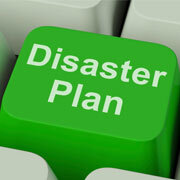WILL YOU BE ABLE TO COMMUNICATE DURING A CRISIS?

If disaster struck your company tomorrow, would you know how to quickly reach employees and their families? Would you be able to talk to them quickly and efficiently? If the answer to those questions is anything but a resounding "yes," it's time to create or review your crisis communication plan.
Basic Info
One of the most important ingredients for emergency preparedness is also the thing that many companies pay minimal attention to: employee contact information. Although organizations typically ask new hires for these details, they often forget to update the data. So make it a habit to ask employees to refresh their contact information at least once a year. To help you remember, tie it to a specific event such as your benefits enrollment period.
In addition to gathering employees' mailing and alternate e-mail addresses, and home and cell phone numbers, get similar information for their emergency contacts. And ask each worker to designate a few emergency contacts, such as spouses, friends and neighbors. Doing so will help you to quickly reach someone when necessary. It's critical that you safeguard this information and system access to it, and ensure employees understand the circumstances when the emergency information can be used and how to protect it.
Additional Measures
Most companies can quickly reach many, if not all, employees by simply sending an e-mail or posting an announcement to their intranets. But these methods aren't effective if there's a power outage or network interruption, or if employees are away from their computers. So be prepared to use other means, such as:
Phone trees. Establish the flow of call responsibility, have up-to-date personal phone numbers and distribute a hard copy version of the tree to those who need it — and, most important, keep it current. A good backup measure to phone calls is text messages, assuming one of the numbers provided is a cell phone.
Voice mail. Change the outgoing message of your company's main line to address the situation. If severe weather closes your office, for example, your message could direct employees to stay home. Instruct managers to also do this on their respective voice mail messages.
Social media. Platforms such as Facebook and Twitter offer an easy way to push notifications to where they're accessible. Just bear in mind that these are public forums, so you don't want to divulge sensitive or errant information. On the other hand, communicating via social media allows you to demonstrate publicly how effectively your organization responds to a crisis.
Informed and Protected
Severe weather, accidents or other crises can occur at any time. By outlining communication methods in advance and keeping employee contact information up-to-date and in one location, you'll be able to keep your staff informed and protected.
